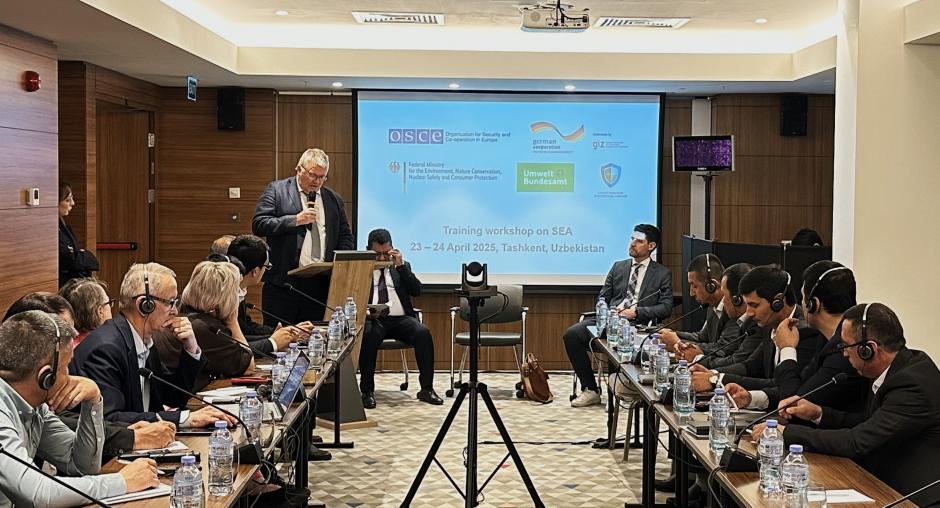OSCE strengthens environmental policy and legislation planning in Uzbekistan

How to effectively evaluate potential environmental policies, plans and programmes was the focus of a training workshop for 40 government and civil society representatives in Uzbekistan organized by the Office of the Co-ordinator of OSCE Economic and Environmental Activities (OCEEA) and the Deutsche Gesellschaft für Internationale Zusammenarbeit (GIZ) in Tashkent from 23 to 24 April.
A team of international and national experts from OCEEA and GIZ, in co-operation with the State Ecological Expertise Committee under the Ministry of Ecology, Environmental Protection and Climate Change of Uzbekistan, led discussions and guided hands-on exercises based on real-life case studies from various countries related to Strategic Environmental Assessments (SEA). SEAs are a way to describe and evaluate the environmental effects of potential plans to support informed decision-making toward minimizing environmental harm.
The participants examined lessons learned from SEA pilot projects in Uzbekistan and discussed key steps involved in the SEA process, roles and responsibilities of institutions and stakeholders and ways to align practices with the requirements of the United Nations Economic Commission for Europe’s (UNECE) SEA Protocol as well as Uzbekistan’s respective national legislation.
Gayrat Mukhamedov, Director of the State Center for Ecological Expertise in Uzbekistan, presented insights into a newly adopted law in Uzbekistan on environmental expertise, environmental impact assessment and strategic environmental assessment. He explained critical concepts the law introduces into Uzbekistan’s legal framework, such as public participation in environmental governance and transboundary environmental impact, and how the law contributes to comprehensive environmental reform.
Antti Karttunen, Head of OSCE Project Co-ordinator in Uzbekistan, underscored the OSCE’s strong commitment to supporting Uzbekistan in advancing the implementation of UNECE’s SEA Protocol, highlighting SEA as a key tool for integrating environmental and social considerations into decision-making processes, enhancing transparency and aligning national planning with global sustainable development goals.
The workshop was part of the OSCE project, “Strengthening National and Regional Capacities and Co-operation on Strategic Environmental Assessment (SEA) in Central Asia – Phase II”, and was organized in close collaboration with the GIZ-funded initiative, “Improving Regional and/or Sectoral Development Plans Based on Strategic Environmental Assessments in the Aral Sea Region (Kazakhstan and Uzbekistan)”. The OSCE component of this initiative is funded by the Advisory Assistance Programme of the German Federal Environment Ministry, under the supervision of the German Environment Agency.
